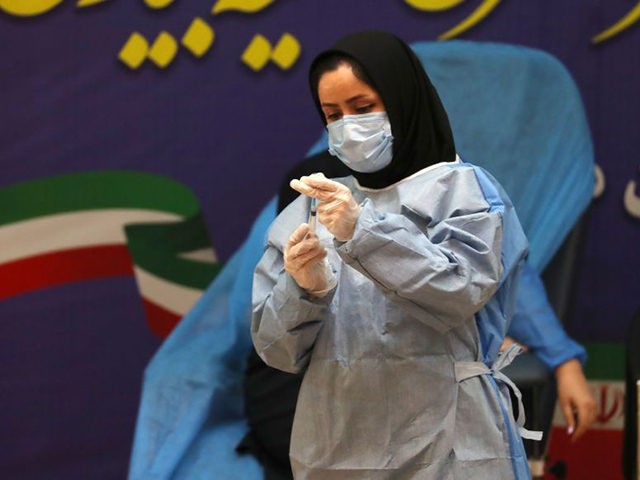The Islamic dictatorship of Iran celebrated the arrival Thursday of 100,000 doses of coronavirus vaccine candidates made in Cuba, which claims to have four such products in development.
Iran and Cuba are close diplomatic partners and both claim to be developing vaccines against the Chinese coronavirus. Cuba has registered four experimental coronavirus vaccine products with the World Health Organization (W.H.O.)’s tracking database of products. The most advanced of the four, “Soberana 02,” reportedly began Phase III clinical trials this month.
Tehran has divulged little about its alleged coronavirus vaccine candidate, other than the fact Cuba will host human trials. The Iranian regime has also made several other dubious scientific claims, like alleging the Islamic Revolutionary Guard Corps (IRGC), a U.S.-designated terrorist organization, was working on its own vaccine product and had developed a “magnetic” device that detects coronavirus in patients.
Iran’s Tasnim news agency did not specify which of Cuba’s vaccine candidates had arrived in the country this week.
“The aircraft carrying the first shipment, including 100,000 doses of the vaccine, landed at Tehran’s Imam Khomeini International Airport this afternoon,” Tasnim reported. “Earlier, Iran had taken delivery of four consignments of the Russian-made Sputnik-V and one shipment of the Chinese-made Sinopharm COVID-19 [Chinese coronavirus] vaccines.”
The outlet did not provide any information on when those vaccine doses would be available to Iranian patients or if doctors would administer them to the general public or select groups. It did note the Cuban products would join increasingly large numbers of doses of “Sputnik V,” the vaccine candidate developed in Russia, after Tehran and Moscow agreed on a deal allowing domestic production of the vaccine in Iran.
No country’s health authority, including Cuba’s, has approved any vaccine candidate created by the nation’s Communist Party. Cuba appeared to begin shopping its four vaccine candidates — Soberanas 01 and 02, Abdala, and Mambisa — this month to neighboring developing countries that may not have the resources to purchase doses of widely-approved vaccines, such as those manufactured by American firms Pfizer and Moderna. Cuban diplomats reportedly opened a discussion on selling coronavirus vaccine candidates with counterparts in Suriname at the beginning of the month.
The vaccine that the Cuban government is developing with the aid of Iran appears to be “Soberana 02.” According to a report published in January by Granma, the official newspaper of the Communist Party of Cuba, the two countries signed a “historic” agreement that month that would allow clinical trials of that vaccine candidate in Iran. In addition to claiming that the deal would accelerate the development of anti-coronavirus technology, Granma asserted that their cooperation would make a statement against “the cruelest and most inhuman sanctions of the government of the United States” against both rogue regimes.
That month, Granma also claimed Cuba would host Phase II clinical trials of a separate vaccine candidate developed by both Iran and Cuba jointly. The vaccine candidate is allegedly the product of the Pasteur Institute of Iran; Granma did not identify it by any particular name.
“The second phase of the human trial is being conducted under the supervision of the Pasteur Institute of Iran in Cuba. Provided that the second phase is successful, the third phase will be implemented in Iran,” Kianoush Jahanpour, a spokesman for Iran’s Food and Drug Administration (IFDA) announced in January.
“Soberana 02” formally began Phase III clinical trials in Cuba in early March.
Cuba and Iran have both received scrutiny for their lackluster responses to the pandemic spreading within their borders. Iran has documented 1.7 million coronavirus cases since the pandemic began and 61,069 deaths. The Castro regime has documented 59,919 cases of coronavirus and only 365 deaths, a significantly lower number than many of its neighbors, raising concerns regarding the honesty of the Cuban government in tracking cases.
The Castro regime has a long history of falsifying medical statistics, most prominently documenting infant deaths as “abortions” to boast an extremely low infant mortality rate. Cuban slave doctors who have defected from international missions have repeatedly testified to being forced to fabricate data on treating patients, in some cases destroying medicine to later claim to have prescribed it to patients who did not exist, to make the missions appear more efficient.
Last month, defecting Cuban slave doctors testified to falsifying medical data about coronavirus patients specifically, writing that they had treated patients who did not exist, in many cases making up false names to fill up government notebooks.
Criticisms of Iran’s coronavirus response focus largely on the regime’s lack of action in preventing mass gatherings at the height of the pandemic — and, in some cases, organizing “super spreader” events for the regime’s political benefit. Iran held a sham parliamentary election in February 2020, exposing those who voted to crowds at polling stations when evidence of viral spread already existed. Iran attempted to shut down some Islamic shrines in March 2020 but met with fierce opposition by hardline Muslims, who stormed and physically reopened some of the sites in mob attacks.
In July, Health Minister Saeed Namaki complained that Iran’s coronavirus response was “embarrassing” and that his ministry had not addressed the economic damage of lockdowns appropriately, making it impossible for the Health Ministry to advise social distancing measures without also jeopardizing the public’s livelihood” and triggering an “insurrection.”

COMMENTS
Please let us know if you're having issues with commenting.